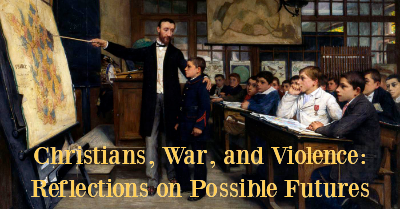|
My blog posts revolve around my interests and vocation as a historian: the intersection of history and contemporary church life, the intersection of history and contemporary politics, serendipitous discoveries in archives or on research trips, publications and research projects, upcoming conferences, and speaking engagements.
I sometimes blog for two other organizations, the Canadian Baptist Historical Society and the Centre for Post-Christendom Studies. The views expressed in these blogs represent the views of the authors, and not necessarily those of any organizations with which they are associated. |
|
Albert Bettannier’s painting La Tache Noire (The Black Spot) in 1887 is a vivid depiction of the education of French children on the subject of the lost provinces of Alsace-Lorraine. It captures the spirit of revanchism, a movement that sought to instil in every Frenchman the duty to wage war against the Germans to retrieve sacred French soil. The spirit of revanchism – revenge – stirred a French generation and contributed to the excitement surrounding the outbreak of the Great War in 1914. Sadly, in numerous places around the globe, the spirit of revanchism is alive and well. In countless places, past injustices are highlighted, bitterness nurtured, hatred stoked, and revenge plotted. The world has many contested lands. In fact, there are few places on the planet that are free from past conflicts and conquest.
Consider the following shortlist (there are many more):
That spirit of revenge is exacerbated when race/ethnicity is tied to land (as is usually the case). That desire for revenge is exacerbated when religion is tied to land (as is usually the case). There are no easy solutions to the reality and memory of lost lands. In many cases, there is no peaceful going back, despite who has justice on their side. Few nations will give up long-conquered land without a fight. Turkey is not about to give back Constantinople and the entire Anatolian peninsula. Russia is not about to give back Crimea. Poland is not going to give back 1/3 of its territory. North America is not going to be depopulated of every immigrant and their offspring from the past 500 years. And so on. Most nations will not even talk about lost lands, and the sentiment that “we are on other people’s land” is anathema – and even illegal – in parts of the world. For instance, Poles in western Poland will never start a class stating that they are on historic German land, Turks will never start the Grand National Assembly with a statement that Constantinople belongs to the Greeks, Indians will not recognize Pakistan’s claims for Kashmir in public meetings, and Britain will not open ceremonies in Gibraltar stating they are meeting on Spanish soil. So what is a way forward for Christians in such a world?
In conclusion, the sad reality is that French revanchism led to a pyrrhic victory. France won the war against Germany and regained its two lost provinces. But the cost to France was close to 2,000,000 dead over 4,000,000 wounded – those wide-eyed and enraptured youth instilled with visions of revenge were decimated.[2] And, to make it worse, the “glorious” French victory led in turn to German desires for revenge and the Second World War … and then even more slaughter in what Neil Ferguson calls the “bloodiest century in modern history.”[3] Christians must contribute to a better possible future than that. (This is blog post #12 in the series entitled “Christians, War, and Violence: Reflections on Possible Futures.” This is the final post in this series.) [1] Miroslav Volf, The End of Memory: Remembering Rightly in a Violent World (Eerdmans, 2006). [2] The overall cost of human life during the entire war among all nations was staggering: over eight million dead and twenty-one million wounded, out of sixty-five million mobilized. [3] Niall Ferguson, The War of the World: Twentieth-Century Conflict and the Descent of the West (Penguin, 2006), xxxiv.
2 Comments
Anthony Bermonte
9/9/2020 11:19:58 am
Absolutely wonderful article and a good warning that revenge quenches no thirst or satiates any hunger. As Ghandi famously said "an eye for an eye makes the whole world blind." Beautifully written.
Reply
Lily Kim
6/3/2021 01:47:44 pm
Looking back on a century of war / violence, Christians indeed have a role to play--no longer virtue-signalling, but enacting peace and authenticity. Tribal & nation-based bonding can perpetuate harms in the guise of "glorious victory." Whither are we bound to see more revenge...or humanizing mercy!
Reply
Leave a Reply. |
Archives
May 2024
|

 RSS Feed
RSS Feed
